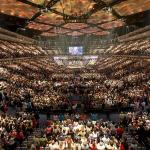Chris Gehrz observes well how plastic the word is and so how big a hurdle it may be to “rescue” the term, evangelical, from people who voted for Trump:
To this day, the Evangelical Covenant Church (ECC) defines itself as “an evangelical church” not only because it “stands in the mainstream of the Protestant Reformation,” quotes the Augsburg Confession, and (in some congregations) still uses Luther’s catechism for confirmation, but more because it grew out of the “religious awakening that flowered in Europe and America during the nineteenth century.”
And yet the ECC didn’t fit neatly into the category of “evangelical” as it developed in the second half of the twentieth century. Some Covenanters embraced the crusades of Billy Graham and sent their children to Wheaton and Fuller; others worried that the older evangelical heritage (Lutheran theology enlivened by Pietism and the Great Awakenings) was being hijacked in the mid-20th century by theologically conservative Protestants who had inherited the Fundamentalists’ understanding of Scripture. Later, some Covenanters joined other evangelicals in switching their vote from Jimmy Carter to Ronald Reagan; others decried the rise of the Religious Right.
As I argued, “Evangelicalism is in the eye of the beholder. It is, in other words, the wax nose of twentieth-century American Protestantism.”
To make it even more complicated, modernists and fundamentalists both claimed to be evangelical:
In 1920, in one of the last pieces he would write, Benjamin Warfield, the verable defender of Calvinism at Princeton Seminary, wrote a piece in opposition to the ecumenical drift that he believed was ruining American Protestantism. The essay was entitled, “In Behalf of Evangelical Religion,” and the object of Warfield’s penetrating intellect was “The Plan of Union for Evangelical Churches,” a scheme developed after World War I to bring many of the denominations in the Federal Council into closer relationship. The creedal statement that was supposed to provide the basis of union was lacking, Warfield argued, because it said nothing about the Trinity, the deity of Christ or the Holy Spirit. He conceded that these were not “distinctively evangelical truths, but the most fundamental truths of common historical Christianity.” But Warfield’s point was that if this plan was to unite evangelical churches it should contain evangelical beliefs.
Part of the reason, however, why the proposed plan for uniting the evangelical churches was vague on evangelical belief was that liberal Protestant theologians, such as Shailer Mathews, the dean of the University of Chicago Divinity School, could use the word to describe his own theological position. In 1924 he wrote a book, The Faith of Modernism, that was designed in part to respond to arguments against liberalism made by the likes of Warfield’s colleague, J. Gresham Machen. As much as contemporary usage places evangelical and liberal in different categories, Mathews used the word evangelical in an older sense, one that had little of Warfield’s confessional precision. “Modernists,” Mathews asserted, “as a class are evangelical Christians. That is, they accept Jesus Christ as the revelation of a Savior God.” He added that briefly put, “the use of scientific, historical, social method in understanding and applying evangelical Christianity to the needs of living persons, is modernism.” Of course, later evangelical theologians would take issue with Mathews’ definition of evangelicalism. And again the point of this exercise is not to decide whether the University of Chicago or Princeton Seminary were better sources of Christian truth. The point, simply, is to show that the word evangelical throughout the majority of American history did not have the significance it has today. In fact, if the experts who conduct opinion polls were asking during the 1920s the same questions they do today about Americans who identify themselves as evangelical, both Benjamin Warfield and Shailer Mathews would answer the same way. (Deconstructing Evangelicalism, 22-23)












